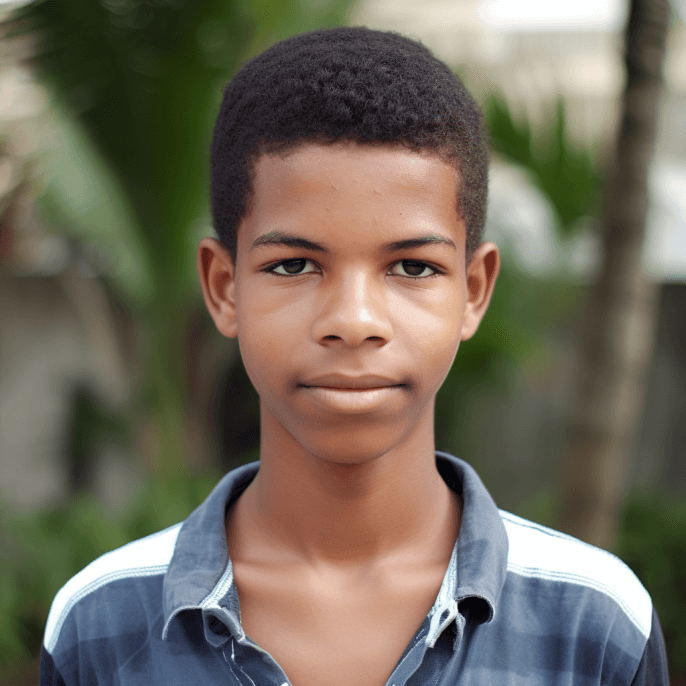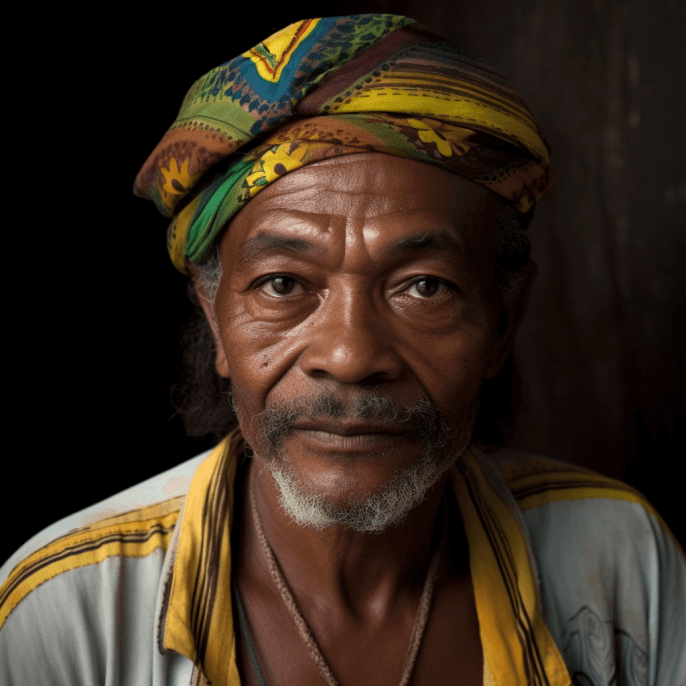



































About the Project
Motivations
At our core, we are driven by a desire for equipping the Mauritius Creole-speaking churches with a reliable Protestant/Evangelical Bible. Our motivation comes from a belief that God has providentially preserved His Word through the ages (Matt 5:18, 1 Peter 1:25), and God’s message should be accessible to everyone, regardless of their language or culture.
Our mission is to produce a Creole Bible that adheres to the principles of formal equivalence and is based on the Received Text (Textus Receptus). Our aim is to provide a translation that is faithful to the original text.
Once completed, we believe that this Bible will serve as a valuable resource for pastors and preachers who engage in the study and expository preaching of Scriptures to Creole-speaking congregations. Additionally, we envision it becoming an essential tool for Creole-speaking believers with limited literacy, enabling them to comprehend and read the Scriptures independently in their mother tongue.
Core Beliefs
Plenary and Verbal Inspiration
We adhere to the principles of plenary and verbal inspiration of the Bible (2 Tim 3:16). Our conviction in the plenary and verbal inspiration of the Bible means that every word was inspired by God (2 Pet 1:21). We believe that the Bible is the authoritative, inerrant (Prov 30:5), and sufficient source for all matters of faith and practice (2 Tim 3:16). As such, it is the duty of the Church and its ministers to accurately transmit the truths of the Scriptures to God’s people (Matt 28:19-20), with guidance and illumination from the Holy Spirit.
The Importance of Language
Furthermore, we hold the conviction that God, who gave the world languages (Gen 11:6-7), wills for His Word to be proclaimed to every nation and in every tongue (Mat 24:14). We believe that it is the responsibility of the Church to transmit and communicate God’s message to the people (Mat 24:14) in a language that they understand and that speaks to their heart, their mother tongue (Acts 2:6-7).
“every man heard them speak in his own language. ” –Acts 2:6-7
Due to the unavailability of a reliable Creole Bible, churches in Mauritius resort to using the French Bible. While some individuals in Mauritius may possess a high degree of fluency in French and can read, write, and speak it proficiently, others struggle with reading comprehension, especially when it comes to the French Bible, given that French is not their primary language.
Moreover, literacy and education levels are crucial factors that determine one’s fluency and comprehension of French. Although Worldbank.org estimates literacy rates in Mauritius to be relatively high at around 92% (Decreasing), Dev Virasamy, in an article published in L’Express titled “Literate Nation Really?”, suggests that the actual adult literacy rate in the country may be much much lower. Given an overall pass rate of only 64% in primary school, the 92% would be less likely unless successful efforts in adult education and other factors beyond primary school performance are being done, which is not the case in Mauritius.
This suggests that a significant portion of the people of Mauritius may face challenges with accessing the Bible on their own and may be dependent on others more than we may think. Morever, believers have expressed their wish to be able to read the Bible on their own. Addressing the issue of the unavailability of a reliable Creole Bible would be the first step, considering the inherent ease associated with learning in one’s native language.
For the Church
While we acknowledge the importance of creating an understandable and accessible text for both believers and non-believers, our primary goal as translators is to equip the Church with the unadulterated Word of God, accurate and theologically precise (2 Tim 2:2, 1 Cor 1:18, 1 Cor 2:14). This goal is reflected in our choice of a formal equivalence translation approach.
We are convinced that the modern dynamic equivalence translations method, put forward in 1964 by Eugene Nida[1] that emphasizes thought-for-thought translation, utilizing tools such as paraphrasing and simplification of complex structures, may sound more accessible and be easier to read. However, they may also fall short in conveying the full nuance and precision of the original text (Acts 20:27-28). Furthermore, such approach may allow the translator to insert subjectivity and their own interpretation or bias into the text, which could compromise the fullness of God’s message.
Therefore, our approach is to be “as literal as possible, as free as necessary (Quoting TBS),” meaning we prioritize following the original Greek grammar, form, vocabulary, and syntax as closely as possible to account for every word in the text during translation, as long as the Mauritian Creole language allows, and have faith in the Holy Spirit to aid the Church, through wisdom, or teachers (Eph 4:11-12), in comprehending any difficult rendering presented in essentially literal translated text.
God’s Preservation of His Word
We believe in God’s providential power to preserve His Word throughout history. We hold the conviction that the Bible is the inspired and inerrant Word of God, and we reject the notion that two contradictory families of texts can both represent the authentic Word of God. Such a notion contradicts the teaching of the Bible, and goes against God’s attribute and character (1 Cor 14:33).
We hold a firm conviction that God has supernaturally preserved His Word for us, and we can confidently rely on its accuracy, authenticity, and accessibility. We affirm that God has divinely guarded His Word through the Byzantine Text, a manuscript tradition of the Greek New Testament that has been preserved by His providential care for centuries. From the Byzantine Text, the Textus Receptus was produced, a Greek New Testament that has been widely used and embraced by the Church.
Scholarship and Divine Preservation
While we acknowledge and value the contributions that scholarship has made to Christianity, we are cautious about relying solely on human reasoning to make decisions about the Bible. We believe that the teachings of the Bible should be the foundation of all our thinking and decision in relation to our translation work (Is 55:8-9). The Bible assumes the inspiration, preservation (1 Peter 1:25), and transmission of God’s Word in the proclamation of the gospel, and does not assume the rediscovery (i.e. hidden for centuries in 2 manuscripts to be revealed fairly recently) or restoration of the Bible (e.g. by means of advanced algorithms and computational techniques i.e. CBGM).
It may seem conservative, or old-fashioned, or resistant to change, but we view it as a dangerous endeavor to remove or reject passages in the Bible that have been transmitted through centuries based solely on modern scholarly work, regardless of the reputation, or intellectual prowess of those scholars (2 Cor 11:14). That may reflect a humanistic mindset that places more trust in the work of fallible men over the providential and supernatural work of God (1 Cor 1:20-21). No matter how appealing the fruit may appear, we are called to submit to the Higher Authority.
Textual Tradition
We have made a deliberate choice not to use the Modern Critical Text as the basis for our translation work. We hold the conviction that the Modern Critical Text, while based on scholarly, critical examination of various sources, does not truly acknowledge the providential preservation of God’s Word. Moreover, it is not a textual tradition but rather a modern reconstructed text, still ongoing and never-ending, as new manuscripts are considered and new techniques are developed (Eph 4:14-16), and there is no biblical basis to suggest that this process is the means by which God intends His Word to reach His Church. In contrast, we believe that God supernaturally and providentially preserved His Word which has always been accessible to the Church throughout history, passed down faithfully through generations (2 Tim 1:13-14). The Byzantine text-type has been widely used and embraced by the Church for centuries and that embodies the biblical, historical, and providential transmission of the New Testament.
- World Bank. (n.d.). Literacy rate, adult total (% of people ages 15 and above) – Mauritius. Retrieved from https://data.worldbank.org/indicator/SE.ADT.LITR.ZS?locations=MU
- Literate Nation Really?. L’Express, 11 May 2023, https://lexpress.mu/blog/366611/literate-nation-really. Accessed 11 May 2023.
- UNESCO. (2015). Education for All 2000-2015: Achievements and Challenges. Retrieved from https://unesdoc.unesco.org/ark:/48223/pf0000190192
- UNESCO, Why mother language-based education is essential, UNESCO, accessed [insert date], https://www.unesco.org/en/articles/why-mother-language-based-education-essential.
- Nida, E. A.(2000). Principles of Correspondence. The Translation Studies Reader, ed. Lawrence Venuti, London and New York: Routledge
Concerns
Ecumenical influence on Bible translation and Bible societies
Handling the Holy Word of God is a solemn responsibility that must not involve altering the text to suit personal doctrines or conform to the norms and values of specific groups in order to appease a general consensus. We are deeply concerned about the pervasive influence of ecumenism within bible societies, as it presents significant challenges to the integrity and accuracy of translations. The inclusion of individuals from all denominations, regardless of their doctrinal positions, increases the risks of liberal interpretation, distortion, and a careless or irreverent handling of scripture during the translation process.
| Ref. | Verse | Version |
|---|---|---|
| Rom 1:7 | To all that be in Rome, beloved of God, called to be saints. | KJV |
| Rom 1:7 | Mo pe ekrir pou tou bann ki dan Rom ki Bondie kontan e ki li finn apele pou swiv Zezi Kris. | KMNT |
Wide Acceptance of the Critical Text and Departure from the Received Text
We grieve that many evangelicals in the last century have embraced the Modern Textual Critics’ Greek edition, which is used in both The Bible Society of Mauritius Creole Version and the Jehovah’s Witness (Watch Tower Bible) Creole Version without fully understanding its eclectic methodology, its origin, and without realising what is at stake. The allure of its scientific and academic approach has led to an inadvertent compromise; although modern critical advocates assert that no doctrine has been affected, this approach has undermine the doctrine of the inspiration, inerrancy, and preservation of God’s Word and has led to the adoption of two contradictory Greek texts (Byzantine Text-type versus Modern Critical Text).
As we grieve the embrace of humanistic modern textual criticism by many churches, we commit ourselves to uphold biblical integrity in our translation efforts. We are dedicated to maintaining a translation approach guided by the teachings of the Bible and trusting in the Holy Spirit’s power to bring understanding to His Church on this matter.
- • “The United Bible Societies and Rome.” Way of Life Literature, https://www.wayoflife.org/database/biblesocieties.html;
• United Bible Societies and the WCC offer new insights on the Bible in Christian traditions.” World Council of Churches, https://www.oikoumene.org/news/united-bible-societies-and-the-wcc-offer-new-insights-on-the-bible-in-christian-traditions.
• Bible Society of Mauritius. “Our History.” The Bible Society of Mauritius, http://biblesociety-mauritius.org/our-history/ (accessed May 16, 2023) - • The Bible Societies.” Trinitarian Bible Society Quarterly Record, Jan-Mar 1979, page 13-14
Project Goals
- Develop a faithful Mauritian Creole Bible, free from denominational bias and modern textual criticism influence.
- Base the translation on the ‘Received Text’ for its robust historical transmission and pedigree.
- Produce a New Testament translation in Mauritian Creole that is accurate, reliable, and accessible for Creole-speaking churches.
- Produce a translation with an oral-auditory dimension that resonates with those familiar with formal equivalence or essentially literal translations.
- Ensure the translation remains free from contemporary social, cultural, theological, and ideological distortions.
- Preserve the integrity of the original text through faithful rendering, translating verb for verb, noun for noun, and adjective for adjective.
- Include all verses predating the era of modern textual criticism to maintain a comprehensive and accurate representation of the original text.
- Uphold the principles of verbal inspiration, ensuring every word of Scripture is God-given, and plenary inspiration, recognizing all parts of the Bible as divinely authoritative.
Specifications
- Greek Text: Scrivener’s Textus Receptus
- English Reference Text: King James Version
- French Reference Text: Bible de Genève (TBS)
- Translation Language: Mauritian Creole
- Orthography: Gramer Kreol Morisien as developed by Akademi Kreol Morisien (AKM)
- Translation Method: Formal Equivalence
- Scripture: New Testament
- New Testament Canon: Matthew, Mark, Luke, John, Acts, Romans, 1 Corinthians, 2 Corinthians, Galatians, Ephesians, Philippians, Colossians, 1 Thessalonians, 2 Thessalonians, 1 Timothy, 2 Timothy, Titus, Philemon, Hebrews, James, 1 Peter, 2 Peter, 1 John, 2 John, 3 John, Jude, Revelation.
FAQ
Why do the Mauritian Church need a new translation if the Mauritius Bible Society has already published the New Testament in Mauritian Creole?
In addition to our previous statements, the comparative table below serves as a demonstration of the need for a new translation of the Bible into Creole. For the purposes of this comparison, we have chosen the KJV, the Louis Second 1910 as the French translation for comparison, as it is the most used version in the French-speaking world and is most commonly used by churches in Mauritius.
| Verse | Old (NTMK) | New | KJV | LSG |
|---|---|---|---|---|
| John 1:17 | Si par Moiz nou finn resevwar lalwa, par Zezi Kris nou finn resevwar enn lamour infini. | Akoz lalwa tinn done par Moiz, me lagras ek laverite ti vinn par Zezi Kris. | For the law was given by Moses, but grace and truth came by Jesus Christ. | car la loi a été donnée par Moïse, la grâce et la vérité sont venues par Jésus-Christ. |
| John 4:11 | Fam la dir li, “Misie, ou pena nanye pou tir dilo, e sa pwi la bien fon, kot ou pou al gagn dilo lasours? | Fam-la dir li, Misie, to pena nanye ar ki pou pwize, e pwi-la li fon: depi ki kote alor to gagn sa dilo vivan la? | The woman saith unto him, Sir, thou hast nothing to draw with, and the well is deep: from whence then hast thou that living water? | Seigneur, lui dit la femme, tu n’as rien pour puiser, et le puits est profond; d’où aurais-tu donc cette eau vive? |
| John 9:4 | Tanki ankor lizour, nou bizin fer travay Sa-Enn ki finn avoy mwa la; lanwit pe vini kot personn pa kapav travay. | Mo bizin travay bann travay seki finn anvoy mwa la, tanki lizour: lanwit pe vini, kot personn pa kapav travay. | I must work the works of him that sent me, while it is day: the night cometh, when no man can work. | Il faut que je fasse, tandis qu’il est jour, les oeuvres de celui qui m’a envoyé; la nuit vient, où personne ne peut travailler. |
| John 9:35 | Zezi finn aprann ki zot finn pous aveg la; letan Zezi trouv li, li demann li, “Eski to krwar dan Garson Limanite?” | Zezi ti tande ki bann-la tinn met li deor; e kan li tinn trouv li, li ti dir li, Eski to krwar dan Garson Bondie? | Jesus heard that they had cast him out; and when he had found him, he said unto him, Dost thou believe on the Son of God? | Jésus apprit qu’ils l’avaient chassé; et, l’ayant rencontré, il lui dit: Crois-tu au Fils de Dieu? |
Why use the KJV as the reference English text?
- The KJV has withstood the test of time, proving its reliability and endurance.
- It is the product of 47 translators who demonstrated proficiency in Hebrew, Greek, and related languages, including Aramaic, Syriac, and Latin.
- The KJV employs a distinct grammar system to differentiate between plural and singular forms.
The inflections of verbs and the usage of terms such as “thou,” “thy,” “ye,” etc., facilitate the identification of whether an individual or a group is being addressed. - The KJV incorporates italics to signify words added by the translation team.
- The KJV is based on the Greek text of the New Testament known as the Textus Receptus, a faithful representation of the text utilized by churches for centuries. In contrast, most modern translations employ a revised Greek text from the United Bible Societies (UBS), which sources relatively few and disputable manuscripts assembled by contemporary textual critics.
What denomination are the translators affiliated with?
People who have been involved with our translation team come from the Baptist, Assembly of God and Church of Christ denominations. Although the current translators are from these three denominations, this does not mean that the team is limited to them. However, we do require that all translators agree with the following statement of faith.
- Statement of Faith
THE BIBLE We believe the Holy Bible was written by men divinely inspired and is God’s revelation of Himself to man; that it has been providentially preserved, does not only contain and convey the Word of God, but is the very Word of God. We believe the Bible to be the supreme judge by whom all the controversies of religion are to be determined, and all the decrees of councils, the opinions of writers, the doctrines of men, and the private spirits, are to be examined. APOCRYPHA We believe the books commonly called Apocrypha, not being of divine inspiration, are no part of the canon of the Scripture, and, therefore, are of no authority to the church of God, nor to be any otherwise approved or used in any way other than any other human writings. THE TRUE GOD We believe in one true God, who exists eternally as three persons— Father, Son, and Holy Spirit, equal in every divine perfection and executing distinct but harmonious offices in the great work of redemption. JESUS We believe that Jesus is the eternal Son of God; fully God and fully man. Through His life, death, and resurrection, He did all that was necessary to make salvation possible. HOLY SPIRIT We believe the Holy Spirit is a divine person, equal with God the Father and God the Son and of the same nature. THE GOSPEL The gospel is the good news that God saves sinners through Jesus’ life, death, and resurrection. ORIGINAL SIN We believe that, through Adam, sin has broken all humanity and creation, leaving the world in need of salvation. SALVATION BY GRACE We believe that salvation is by grace through faith in Christ. SATAN We hold Satan to be man’s greatest tempter, the enemy of God, the accuser of the saints, He is destined, however, to final defeat and to a judgment of everlasting fire, prepared for him and his angels THE CHURCH We believe that a church is a congregation of baptised believers observing the ordinances of Christ, governed by His laws, and exercising the gifts, rights and privileges conferred upon them by His Word; that it has as its mission to make Jesus known by preaching the Gospel and to teach and instruct as Jesus commanded. BAPTISM We believe that Christian baptism is the immersion in water of a believer in the name of the Father, of the Son, and of the Holy Spirit. COMPLEMENTARIANISM We believe that men and women are equals, created by God to fulfill different roles as coworkers in His kingdom. SEXUALITY We believe that God has ordained that no sexual activity should take place outside of marriage between a man and a woman. JESUS’ RETURN We believe that Jesus will return to both restore creation and judge the living and the dead.
Who is the initiator of the project?
Feeling the absence of a reliable Creole Bible while leading a small, low-literacy Creole-speaking church in Mauritius, Jean-Lou Désiré felt compelled to start working on the project. He is currently a Master of Arts student in Linguistics, Exegesis, and Translation Management at the FirstBible School of Translation, and he also holds a BA (Hons) in Graphic Design from the University of Arts London. Jean-Lou leads the translation project.
Which Bible Society are you affiliated with?
Although this project was initiated by Mauritians. The translation project is supported by the prayers and under the guidance of the Trinitarian Bible Society and is carried out according to the translation principles of the Society, which was founded in 1831 with the main objective of promoting the Glory of God through the circulation of uncorrupted versions of the Bible.
Is the translation copyrighted?
This translation is protected by copyright. The organisation holding the copyright is the Trinitarian Bible Society. The main reason for the copyright is to protect the integrity of the text from unauthorised and unwarranted modification. However, TBS make every effort not to restrict the text and to give permission wherever it can for it to be used and quoted.
How is this project funded?
This project is not funded by any organisation. For the moment, the translators are self-financed or volunteers. The translators do the translation on a part-time basis. However, in order to speed up the translations, we plan, God willing, to have one or more full-time translators. If you feel moved to support the project financially, click here.
Language Information
| Language | Users in Mauritius | First Language (L1) Users | Second Language (L2) Users |
|---|---|---|---|
| Morisien | 976,000 in Mauritius | 1,034,270 worldwide | 6,540 worldwide |
| French | 926,000 in Mauritius | 51,000 in Mauritius | 875,000 in Mauritius |
| English | 203,100 in Mauritius | 3,100 in Mauritius | 200,000 in Mauritius |
| Bhojpuri | 66,000 in Mauritius | N/A | N/A |
| Hindi | 36,000 in Mauritius | N/A | N/A |
| Tamil | 1,100 in Mauritius | N/A | N/A |
| Urdu | 800 in Mauritius | N/A | N/A |
Most spoken languages in a population of 1,266,000
Sources:
- Leclerc, J. (2018c). Various languages. Ethnologue. Retrieved May 10, 2023, from https://www.ethnologue.com/
- French and English:
- Leclerc, J. (2018). French. Ethnologue. Retrieved May 10, 2023, from https://www.ethnologue.com/language/fra
- Marcoux, L., et al. (2022). La langue française dans le monde 2021. Paris: Organisation internationale de la Francophonie.
- Leclerc, J. (2018). English. Ethnologue. Retrieved May 10, 2023, from https://www.ethnologue.com/language/eng
- Crystal, D. (2003). English in Mauritius. World Englishes, 22(2), 207-220. doi: 10.1111/1467-971X.00257